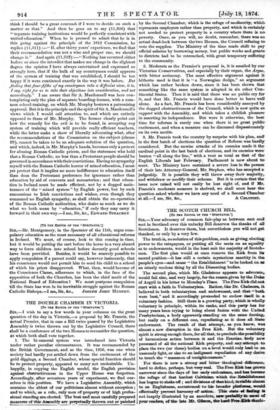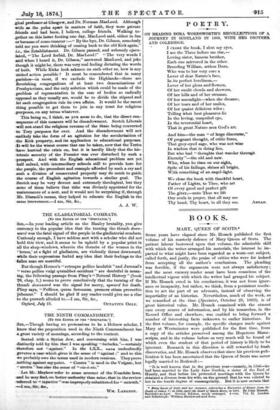1.118, SCOTCH CHURCH BILL [To ras EDITOR OF THE "SPECTATOR."]
Srs,—Your advocacy of common fair-play as between sect anew sect in Scotland over this unlucky. Bill deserves the thanks of all Scotchmen. It deserves them, but nevertheless. you willtrot get, thanked, or only by a very few.
The truth is, no solution of this problem, such. as: giving: 'electing power to the ratepayers, or putting all the sects on an equality as to endowments, would in the least suit the majority of Scotch. men. The first plan would at once remove the Kirk from ita sacred position—it has still a certain mysterious sanctity in tha people's eyes—and cause "the Establishment" to be looked on as an utterly unclean thing by all the Dissenting bodies.
The second plan, which Mr. Gladstone appears to advocate, would fail also, and very largely, for the reason given by the Duke of Argyll in his letter to Monday's Times. The Free Kirk did not start with a faith in Voluntaryism. Rather, like Dr. Chalmers, it believed in both voluntaryism and endowment, and that both were best," and it accordingly proceeded to endow itself in a voluntary fashion. Still there is a growing party, which is wholly voluntary in principle, within its ranks, and this party has for many years been trying to bring about fusion with the United Presbyterians, a body apparently standing on the same footing, but really on a different one, repudiating as it does all State endowment. The result of that attempt, as you know, was almost a new disruption in the Free Kirk. But the voluntary spirit is strong enough there, for all that, to preclude the possibility of harmonious action between it and the Erastian body now possessed of all the national Kirk- property, and any attempt to place the two (or three) bodies on a level would only lead to an unseemly fight, or else to an indignant repudiation of any desire to touch the "mammon of unrighteousness."
For there is now a strong and bitter theological difference, hard to define, perhaps, but very real. The Free Kirk has grown narrower since the days of her early enthusiasm, and has become the refuge of that hardest Calvinism which the Establishment has begun to shake off ; and divisions of that kind, invisible almost to an Englishman, accustomed to his broader platforms, would effectually prevent harmony of action. This state of feeling is not inaptly illustrated by an anecdote, new probably to most of your readers, of the late Mr. Gibson, the hard Free-Kirk theolo-
glad professor at Glasgow, and Dr. Norman MacLeod. Although wide as the poles apart in matters of faith, they were private Mends and had been, I believe, college friends. Walking to- gether on this latter footing one day, MacLeod said, either in fun or because of some rumour :—" By the bye, Dr. Gibson, somebody told me you were thinking of coming back to the old Kirk again," i.e., the Establishment. Dr. Gibson paused, and solemnly ejacu- lated, "The Lord forbid, Dr. MacLeod!" "The very words I said when I heard it, Dr. Gibson," answered MacLeod, and joke though it might be, there was very real feeling dictating the words of both. While Kirks look askance on each other so, how is any united action possible ? It must be remembered that in many parishes—in most, if we exclude the Highlands—there are flourishing congregations of at least two denominations of Presbyterians, and the only solution which could be made of the problem of representation in the case of bodies so radically opposed as they usually are, would be to divide the stipend and let each congregation rule its own affairs. It would be the =rest thing possible to get them to join in any trust for religious purposes, on any terms whatever.
This being so, I think, as you seem to do, that the direct con- sequence of this measure will be disendowment. Scotch liberals will not stand the religious revenue of the State being converted to Tory purposes for ever. And the disendowment will not unlikely take the form of an agitation for the secularisation of the Kirk property, and its application to educational purposes. It will be the wisest course that can be taken, now that the Tories have hurried the crisis on, but it is hardly likely that the his- trionic serenity of the Premier was ever disturbed by such a prospect. And with the English educational problem not yet half solved, with intermediary schools still to provide here for the people, the precedent and example afforded by such a cry and such a division of consecrated property may do much to guide the course of English agitation towards a similar goal. The Scotch may be very devout and extremely theological, but they none of them believe that tithe was divinely appointed for the maintenance of a sect, and it would not be surprising if, through Mr. Disraeli's means, they helped to educate the English in the same irreverence.—I am, Sir, &c., A. J. W.



































 Previous page
Previous page